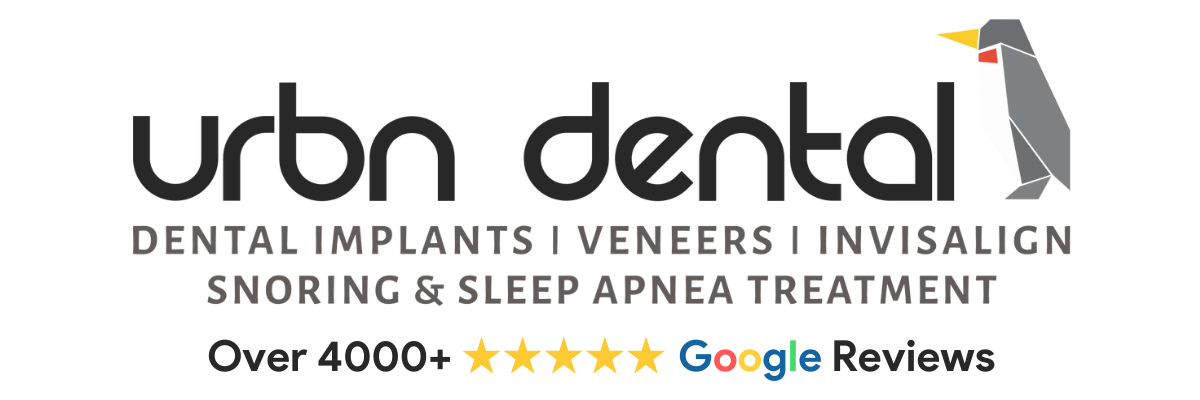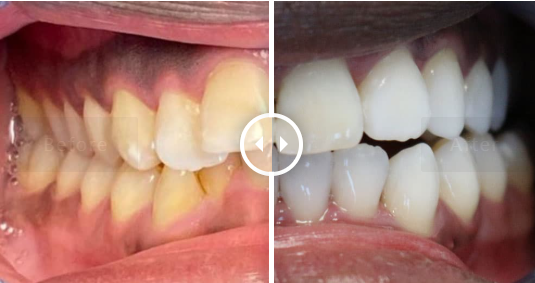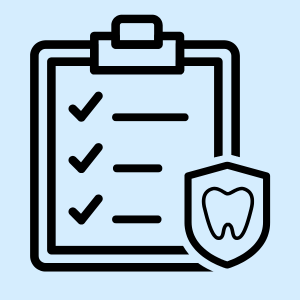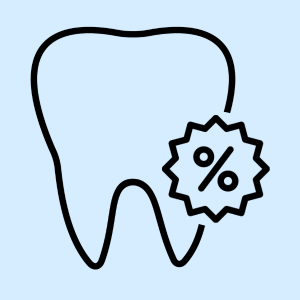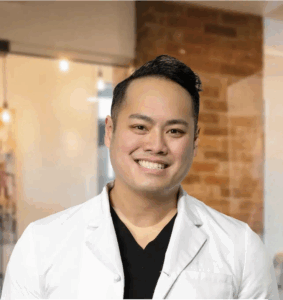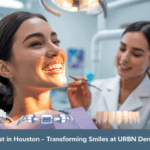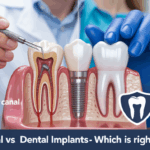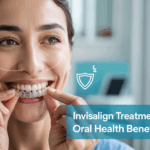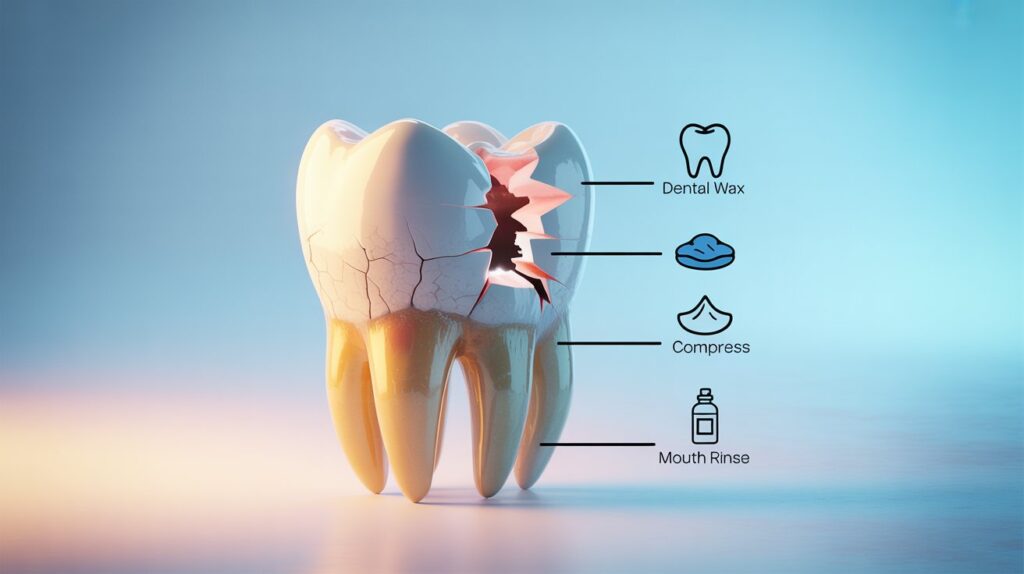
A tooth can fracture in a second. One bite into something hard, one fall, one awkward slip of the jaw, and suddenly, you’re feeling sharp edges where smooth enamel used to be. It doesn’t take long for discomfort to follow. Sometimes it’s pain, sometimes swelling, sometimes a quiet panic that something’s not right. A broken tooth may require timely attention to help minimize discomfort or complications.
In this blog, we’ll walk through what causes a tooth to break, what you can do right after it happens, and how to protect the tooth until you reach our Houston dentist at Urbn Dental.
Common Causes of Broken Teeth
Tooth enamel is strong, but not unbreakable. Under the wrong stress, teeth crack, chip, or split. These breaks may happen to anyone, even people with perfect oral hygiene.
Several things often lead to tooth fractures, including:
- Biting down on hard foods or objects
- Accidents or sports injuries
- Teeth grinding (bruxism), especially at night
- Old, worn-out fillings or crowns
- Sudden temperature changes in the mouth
- Cavities weakening the tooth from within
Contact URBN Dental for same-day appointments when accidents strike unexpectedly.
What You Should Do Right After Breaking a Tooth
The first few minutes after a break may influence the outcome. Damage control is possible, but it starts with smart, immediate actions.
1. Rinse Your Mouth Gently
Use warm water. Rinse carefully. Remove blood, food, or debris around the broken area. Do not scrub or swish aggressively.
2. Apply Pressure If Bleeding
If the gum or surrounding tissue is bleeding, press gently with gauze or a clean cloth. Hold it there for 10 minutes or until bleeding slows.
3. Save the Tooth Fragment
If a piece broke off, store it in milk or saliva. In some cases, our dentist may be able to reattach it. Place it in a sealed container and bring it with you.
4. Use Cold Compress
Place it on the outside of your cheek if swelling begins. Ten minutes on, ten minutes off. Helps reduce inflammation and pain.
5. Avoid Food and Drink
It’s best to avoid chewing and steer clear of very hot or cold foods. It’s best not to touch the area with your tongue until it is seen by a professional.
Note: These are just immediate actions you can take. It won’t completely solve the problem. The next step would be to call URBN Dental — we’re here to help you feel better.
BROKEN TOOTH? WE CAN HELP!
Types of Tooth Breaks and What They Mean
Not all broken teeth are the same. Some are minor and easily fixed. Others involve deep damage and serious intervention. Here’s what each break could mean:
1. Minor Chips
These are often cosmetic—small edges of enamel chip off, usually with no pain. Polishing or bonding may fix the shape in one visit.
2. Cracked Tooth
Cracks run vertically but don’t always reach the gum line. Pain while chewing is common. Prompt evaluation may help prevent further issues.
3. Craze Lines
These are thin cracks in the enamel only. There is usually no pain, but it can be mistaken for serious cracks.
4. Fractured Cusp
A corner of the tooth breaks near a filling. They may not cause pain, but they can compromise the structure of the tooth. A dental crown may be recommended after an evaluation to restore strength and function.
5. Split Tooth
A visible separation runs through the tooth, which can be painful. These cases may require extraction or surgical intervention, depending on the extent of the damage.
6. Vertical Root Fracture
Starts below the gum, often unnoticed until it causes swelling or infection. Vertical root fractures may require removal, depending on the extent of the damage and evaluation results.
Unsure about the severity of your tooth break? Schedule a consultation at URBN Dental today.
First Aid Steps for a Broken Tooth
Before you reach the dental chair, there’s a short list of things that help protect the tooth. Think of it as first aid for your mouth:
- Keep the area clean. Warm salt water rinses help, but don’t overdo it.
- Use dental wax or sugar-free gum to cover sharp edges if they’re cutting your tongue.
- Do not chew on the injured side; even soft food can cause more harm.
- Take over-the-counter pain relief as directed, not aspirin directly on the gums.
- Stay upright. Lying down can worsen swelling.
- Contact a dental office that handles broken tooth repair right away.
Note: These steps are meant as temporary measures until you can receive professional care.
RESTORE YOUR SMILE FAST
When to See Our Houston Dentist Immediately
Delaying care may increase the risk of needing more complex treatment. Our emergency dentist in Houston recommends coming in immediately if:
- The tooth is bleeding and won’t stop
- You see visible cracks down to the gum
- Pain worsens instead of stabilizing
- Swelling appears on the face or jaw
- You can’t close your mouth properly
- You feel a loose or wiggling tooth
- If something feels off or unusual, it’s worth getting a professional evaluation.
Final Thoughts
A broken tooth may seem minor at first, but it can sometimes indicate a deeper issue. We at URBN Dental treat broken teeth with urgency and care. We aim to address the issue promptly and guide you toward appropriate treatment.
So, if you’re looking for a reliable emergency dentist near me or searching for help with broken tooth repair, we’re here. Walk in. Call us. Let one of our emergency dentist in Houston evaluate your emergency and guide you towards the right treatment.
URGENT DENTAL CARE WHEN YOU NEED IT
Frequently Asked Questions
Since tooth enamel doesn’t regenerate, a broken tooth usually requires professional care by our broken tooth repair dentist to prevent further damage or infection.
As soon as possible. Delaying care may increase the risk of complications such as nerve exposure, infection, or, in some cases, permanent damage.
Even without pain, the tooth may still be at risk, so it’s best to get it checked. Silent fractures can worsen over time or expose the pulp without symptoms. It’s best to schedule an evaluation immediately.
In some cases, when a break extends below the gum line or affects the root, an oral surgeon may be necessary. Most surface breaks are treated by general dentists or broken tooth repair specialists.
It’s best to avoid eating until our dentist examines the break. If needed, stick to soft, non-acidic, and room-temperature foods and liquids.
URBN Dental Services in Houston, TX
Houston | Katy | Montrose | West University Place | Greater Third Ward | Greater East End | North East Houston | Houston Heights | Central Northwest | Fairbanks | Acres Home | East Houston | Southeast Houston | Central Southwest | Fort Bend Houston | Brays Oaks | Meyerland Area | Sharpstown | Alief | Westchase | Memorial | Northwest Houston | Katyland | Whispering Lakes | Pine Lakes | Woodcreek Reserve
